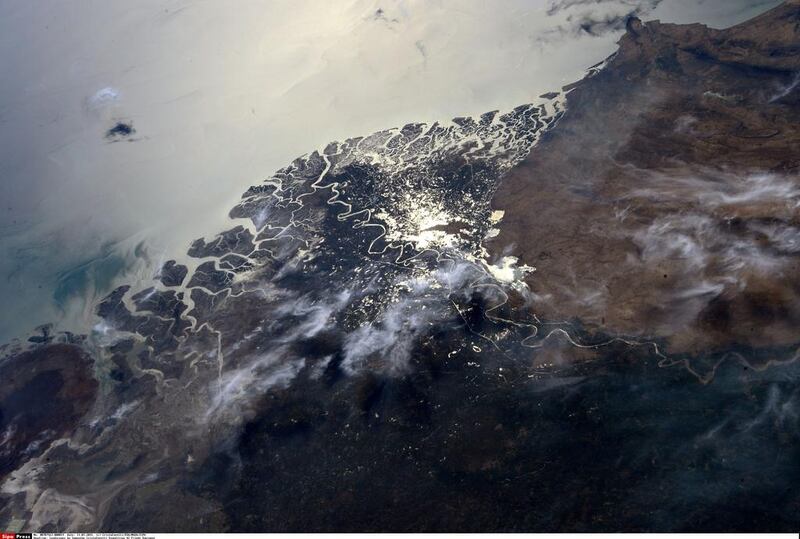NEW DELHI // India plans to review a 56-year-old water treaty with Pakistan in the wake of a militant attack on an army base in Kashmir which killed 18 soldiers.
The attack two weeks ago was carried out by militants sponsored by Pakistan, India has claimed.
The Indus Waters Treaty, mediated by the World Bank and signed in 1960, has held through decades of tension and three full wars.
It pertains to six rivers – including the Indus – whose source lies in India, and outlines how water is to be shared and controlled by both countries in an equitable manner.
At a review meeting of the treaty on Monday, prime minister Narendra Modi explicitly linked the accord to Pakistan-backed terrorism in Kashmir.
“Blood and water cannot flow simultaneously,” Mr Modi said.
The government has not officially stated how it will amend its approach to the treaty.
Even as some media reports suggested that India might revoke the treaty altogether, Sartaj Aziz, the foreign affairs adviser to Pakistan prime minister Nawaz Sharif, warned that such a revocation could be construed as “an act of war”.
“International law states that India cannot unilaterally separate itself from the treaty,” Mr Aziz told the National Assembly in Islamabad. Such an act, he said, would give “Pakistan a good reason to approach the UN Security Council”.
The Indian government has also decided to suspend meetings of the Permanent Indus Commission, a dispute resolution body that meets twice a year, according to the treaty. The commission has thus far met 112 times, with the last meeting held in July.
India could also choose to extract its maximum quota, as allocated to it by the treaty, of 20 per cent of the water from the three western rivers – the Jhelum, the Chenab and the Indus.
For years India has drawn much less than the amount allowed, mostly because it hasn’t needed the full 20 per cent. If it were to divert more water from the Indus in particular into irrigating fields in the state of Jammu & Kashmir, Pakistani farmers downstream would face severe water deficits.
However, even if India decides to increase its extraction of water from the western rivers, it will not be able to hit its full quota immediately, said Himanshu Thakkar, the coordinator of the South Asia Network on Dams, Rivers and People – a network of activists and organisations that assess issues related to rivers across the subcontinent.
"To take out the full quota of water, you need a certain kind of infrastructure, which isn't there at the moment," Mr Thakkar told The National. "You can put in some lifting devices that lift water from the rivers for irrigation. That can be done in the short term. But even with a large number of lifts, you won't get the full entitlement of water."
And drawing an increased volume of water could also cause other kinds of collateral damage, Mr Thakkar said.
“There will be damage in Kashmir itself,” he said. “You will have deforestation, displacement of people, and a disruption of the river and its biodiversity.”
Several members of Mr Modi’s Bharatiya Janata Party (BJP) have been vocal about repealing the water treaty altogether.
“Nothing comes before the country,” Saryu Roy, a BJP minister in the state of Jharkhand, told the IANS news agency on Monday. “If the treaty can be used to teach Pakistan a lesson, then we should use it.”
But Uttam Sinha, a water security scholar at the Institute for Defence Studies and Analyses in New Delhi, said that the people calling to repeal the treaty “is a small constituency”.
"A review [of the treaty] does not mean abrogation [repealing]," Mr Sinha told The National. "It means to look at the provisions of the treaty that entitles India to exploit and harness both the western and eastern rivers of the Indus basin."
The review carries “a strong diplomatic message [that] Pakistan should not take India for granted”, Mr Sinha said.
“[The UN’s] International Law Commission says that states can take appropriate countermeasures in response to wrongful acts by [another] state,” he said.
Even unilaterally suspending meetings of the Permanent Indus Commission, Mr Thakkar pointed out, could be interpreted as a violation of the treaty.
“We have to remember that India has relationships with other countries with whom it shares rivers,” he said. “There’s China, Nepal, Bangladesh, Bhutan and Myanmar. China could well choose to break some of our river water treaties as well, so we don’t want a precedent for that.”
“India has a reputation as a peace-loving country which doesn’t harm its neighbours,” Mr Thakkar said. “I don’t think we want to lose that high moral ground.”
ssubramanian@thenational.ae





